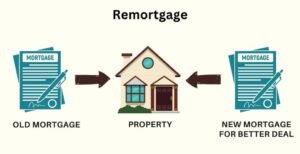
Ever wondered if your home is silently building wealth for you? The answer lies in a concept called ‘equity‘, and understanding how to calculate and leverage it can be the key to unlocking exciting possibilities through remortgaging. But before we get ahead of ourselves, let’s delve into the nitty-gritty of equity and how it impacts your remortgaging options.
Equity: Your Home’s Hidden Treasure Chest
Imagine your home as a treasure chest, gradually filling up with a special kind of wealth – your equity. Every mortgage payment you make adds another precious gem to this chest, increasing the portion of your home you truly own. Other things like smart and strategic improvements to the property can also increase your equity. The higher your equity, the more financial flexibility you can potentially enjoy.
Calculating Your Equity: A Peek at Your Treasure
The good news is that calculating your equity is a breeze. Here’s the formula to crack the code:
- Equity = Current Market Value of Your Property – Your Outstanding Mortgage Balance
Let’s Make it Real with an Example:
Suppose you’ve done your research and believe your home’s market value today might be around £250,000. You also have your latest mortgage statement handy, showing a remaining balance of £180,000.
Time to unlock the treasure! Equity = £250,000 (market value) – £180,000 (mortgage) = £70,000 equity
Congratulations! Based on this estimate, you’ve accumulated a valuable £70,000 in equity in your home.
Equity and Remortgaging: Keys to New Possibilities (But Remember, There’s Always a Lock)
Now, let’s explore the world of remortgaging. Think of it as potentially swapping your current mortgage for a new one, with features or interest rates that better suit your needs. Here’s where your equity truly shines:
- Equity: The Key to Better Deals: The more equity you’ve built up (the less you owe on your mortgage), the more attractive you appear to lenders when remortgaging. This can translate into securing a better interest rate, potentially saving you money each month. In some cases, your accumulated equity might also allow you to borrow additional funds through remortgaging. These funds can be raised for a range of reasons, such as home improvements, debt consolidation, going on a holiday or more.
Example: Equity Can Open Doors
Imagine two scenarios:
- Scenario 1: Sarah has a £180,000 mortgage remaining on a property valued at £250,000 (same equity as our example, £70,000).
- Scenario 2: David only has a £150,000 mortgage remaining on a property with the same value of £250,000 (higher equity of £100,000).
Due to his higher equity, David might be offered a more competitive interest rate on a remortgage compared to Sarah (including the opportunity to borrow more against his property compared to Sarah, because of the increased equity). This could mean significant monthly savings for David (particularly based on achieving a potentially better interest rate than Sarah). While a lower interest rate or accessing additional borrowing against the increased equity can be attractive, if your financial circumstances change and you can’t keep up with the repayments, you could risk losing your home.
Important Note: These are simplified examples, and actual remortgage offers will depend on various factors like your credit score, personal circumstances and the lender’s criteria.
Ready to Explore Your Options, But Cautiously?
Understanding your equity is a crucial first step in considering a remortgage. However, navigating the financial world requires a balanced approach. If you’re in need with any help on this, we can help you:
- Get a more accurate estimate of your property’s current value
- Assess your current mortgage deal and potential remortgage options
- Carefully consider the impact of remortgaging on your monthly outgoings
- Take you through the remortgaging process, ensuring you make informed decisions for your long-term financial goals
Contact us today for a no-obligation consultation and unlock the exciting possibilities that your homeownership journey holds!






